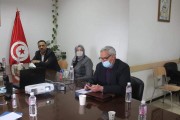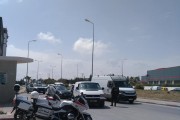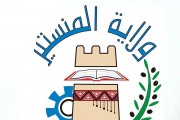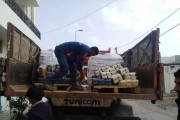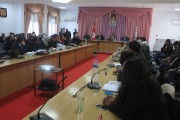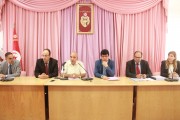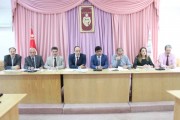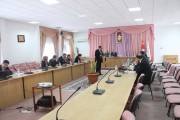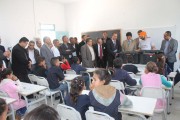Encourage and sensitize farmers in the state of Monastir to use treated and controlled water.
Organization of an awareness campaign among farmers to benefit
of the exemplary experience of Wardanin.
Activate the regional sludge recovery committee and hold it periodically every two weeks.
As part of raising awareness of the importance of enhancing the use of treated water in agriculture, a meeting of the regional committee in charge of controlling and monitoring the use of treated water was held on Wednesday, June 23 2021..
Under the supervision of Mr. Akram El Sebri, the governor of Monastir, and in the presence of Mr. El Bashir Attia, Secretary General of the State, the mayors and representatives of the regional administrations concerned, he devoted himself to monitoring the reality and problems of irrigated perimeters irrigated with treated water.
The governor of Monastir underlined the importance of presenting the exemplary experience of the irrigated perimeter with treated water in Ouardanine, and called for organizing an agricultural awareness campaign in the governorate of Monastir to irrigate with treated water with stations. purification and monitoring by the structures concerned and recognized for the quality and safety of water.
The governor of Monastir also authorized the activation of the regional committee for the valorization of sludge (solid matter resulting from the treatment process of the purification stations) and to hold it periodically every two weeks in order to examine how to valorize the exploitation. sludge as an organic fertilizer for the land, in accordance with specifications and approved scientific methods.
Mr. Moufid Al-Zarqa, head of the irrigation department of the Regional Commissariat for Agricultural Development of Monastir, made a presentation on the reality and the problems of the use of treated water, explaining that the experience of use of treated water in the plantation of trees and fodder has been a culture in Monastir since 1997, date of the establishment of a secondary treatment purification station in Wardanin with a capacity of 1500 cubic meters per day. The irrigated perimeter was supplied with Wardanin over an area of 50 hectares, then extended to 74 hectares for the irrigation of fruit trees, fodder cultivation and supplemental irrigation for olives. Then, a filtration station was implementation, considered as a model at national level to improve the quality of treated water.
And the second experiment in the irrigated perimeter with treated water for the Sayada Lamta Bouhajer wastewater treatment plant, which has an estimated capacity of 1160 cubic meters per day to irrigate 50 hectares of olive trees and fodder crops.
And the head of the irrigation service added that it is programmed to use the treated water from the Beni Hassan wastewater treatment plant (1,500 cubic meters per day / triple treatment) on an area of 10 hectares and with the possibility of extending to the limits of 30 hectares and use it in supplemental irrigation for olives and for the cultivation of fodder.
The head of the Department of Irrigated Perimeters of the Regional Commissariat for Agricultural Development of Monastir underlined that by creating new purification stations for the treatment of domestic water and in front of the expansion and renewal of certain stations and with the improvement of the quality of water treated with triple treatment, it is possible to respond to the expansion of certain irrigated areas in the face of current problems and mainly represented by the low quality of water in certain stations and the stagnation of water in certain valleys or dumping it into the sea, adding that many agricultural areas suffer from the problems of sewage sewage flooding and its impact on agricultural facilities and agricultural products, as well as the environmental pollution they cause.
In turn, Mr. Mohamed Makada, representative of the Regional Union of Agriculture and Fisheries in the Wilayat of Monastir, and a farmer from the irrigated perimeter of Al-Wardanine, spoke about his agricultural experience and the irrigated perimeter. typical of Al-Wardanine, which has extended to 74 hectares and produces fruit trees of plums and figs and is a destination for scientific research and studies and a sanctuary for agriculture of all the cultivation areas irrigated area of the Republic of Tunisia, in addition to the fact that the irrigated area of Al-Wardanine, which is irrigated with treated water, is the first nationally to use sludge as an organic fertilizer to fertilize the land
Makada added that he encourages the weavers to experiment with the cultivation of the irrigated area in Wardanin and circulate it to the rest of the regions to improve production and productivity and ensure the sustainability of agricultural production, especially in the face of the scarcity of irrigation water in times of drought, emphasizing the need for periodic monitoring and intensification of analyzes of water safety and quality and the call to improve water quality of water through the development of triple treatment purification stations.
Walid al-Faqih, representative of the regional administration of the National Office of Disinfection, explained that the region has 4 treatment plants from which treated water is used, similar to the stations Wardanin, al-Sahelin and Farina, and the triple treatment of the Beni Hassan wastewater treatment plant.
The representative of the National Office for Disinfection added that the capacity of the four stations (Wardanine, Sahel, Al-Farinah and Bani Hassan) is equivalent to 27,870 cubic meters per day. In 2020, the equivalent of 20,340 cubic meters per day. day has been tapped. , with a rate of use of treated water estimated at 65.5% ..
https://g-monastir.tn/en/joomla-4/content-page/all-categories/sample-category-3/1668-2021-06-25-21-50-28#sigProIdc00ab080d1







